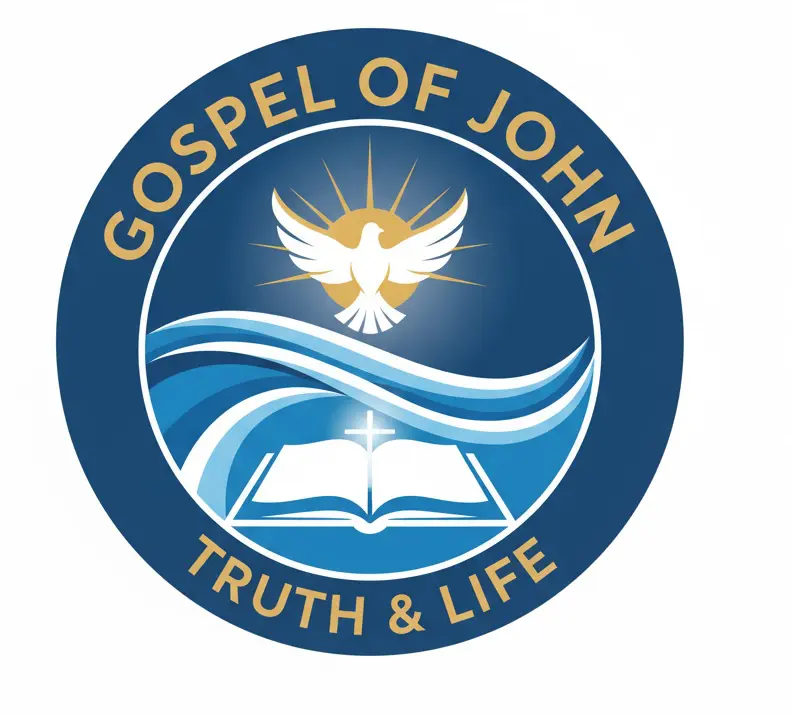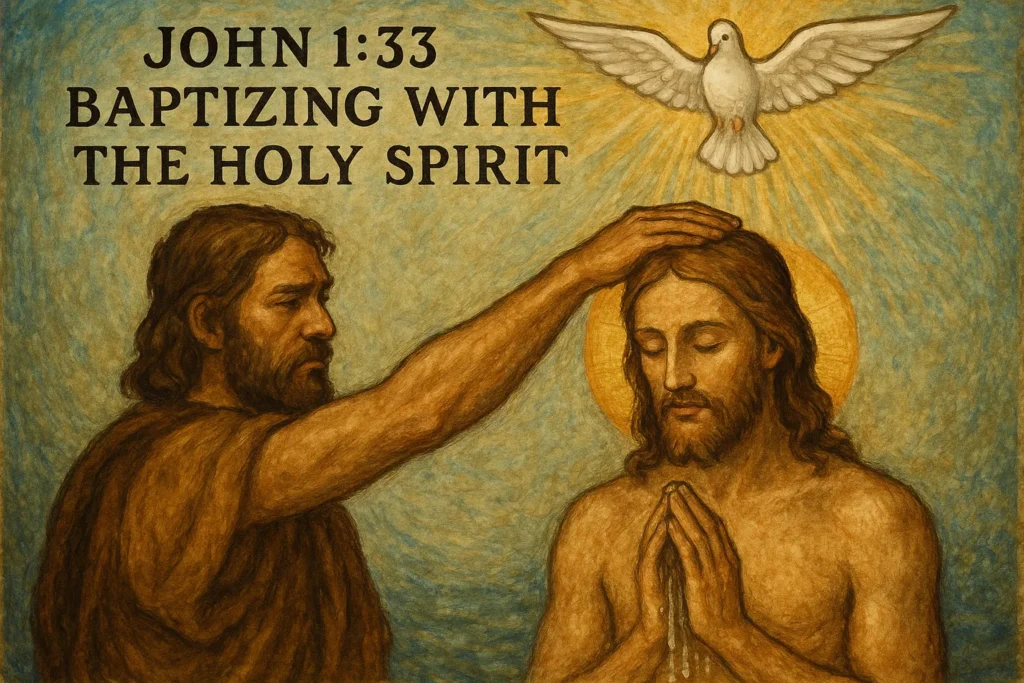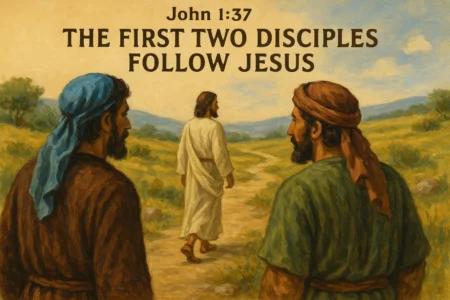Have you ever felt like you were waiting for a sign? I’m not talking about just any sign, but a “this-is-it,” life-changing kind of moment. A moment that finally makes everything click. That green light from the universe that clarifies your purpose and sets your feet on a brand new path.
I think we all have. We crave that confirmation.
For a man named John the Baptist, that moment of pure, undeniable clarity is all wrapped up in a single, powerful verse. This was a man with a laser-focused mission: get the world ready for someone greater. His entire life was a flashing arrow pointing toward a person he hadn’t yet officially met.
Then, the sign came.
The verse is John 1:33. It’s John’s own words, his “aha!” moment where God finally pulled back the curtain and said, “That’s him.” It’s a real turning point in the story, separating John’s ministry from the one that would change everything. We’re going to unpack this verse, because getting John 1:33 explained is about more than old history. It’s the hinge on which a new spiritual reality swings, a shift from the symbol of water to the substance of the Holy Spirit. This one verse explains not only who Jesus is but what he came to do.
More in John Chapter 1 Category
Key Takeaways
- The Verse’s Speaker: John 1:33 is the direct, eyewitness testimony of John the Baptist, fulfilling his unique role as the forerunner to the Messiah.
- The Divine Sign: God gave John a specific, two-part sign to identify the Messiah: he would see the Holy Spirit descend and remain on this person.
- The Great Contrast: The verse draws a sharp line between John’s baptism (with water, symbolizing repentance) and Jesus’s future baptism (with the Holy Spirit, bringing empowerment and God’s presence).
- The Unique Authority of Jesus: This verse establishes Jesus’s divine authority. Only he is “the one who will baptize with the Holy Spirit.”
- The Promise for Believers: This baptism of the Holy Spirit isn’t just a historical event for Jesus; it’s the very thing Jesus came to give to all who follow him.
Who Exactly is Speaking in John 1:33, and Why Should We Listen?
First, we have to know who is talking. This isn’t a narrator. It’s John the Baptist himself. This is a first-person, “I-saw-it-with-my-own-eyes” account from the one man God hand-picked for this job. This was the guy crying out in the wilderness, the prophet Isaiah had foretold. He was rough-edged, blunt, and radically obedient. His whole life was just the warm-up act.
And he kicks things off with a stunning admission, really: “I myself did not know him…”
That line, for me, is what makes him so trustworthy. He wasn’t biased. He didn’t just pick his cousin Jesus out of a family lineup. He was waiting on a divine signal, not a personal feeling. This builds incredible credibility. John is making it perfectly clear that he’s not the main event. He’s just the stagehand pulling the rope for the main curtain.
His authority came straight from God. He continues, “…but the one who sent me to baptize with water told me…” This whole thing wasn’t John’s idea. He was on a mission from God, operating under direct orders. God gave him his job description: “Go baptize with water, and keep your eyes peeled for the One.” John is, in essence, a sworn witness, pointing his finger and saying, “That’s the man. God told me so.” His testimony is the foundation for everything that comes next.
What Did John’s “Baptism with Water” Actually Mean?
This is a big one. We hear “baptism” and our mind jumps to what happens in a church today. John’s baptism was something different.
His was a baptism of repentance.
In Jewish culture, ritual washings, or mikvehs, were a normal part of life. They were a way to get “clean” again for religious life. But John took that familiar concept and filled it with urgent, prophetic meaning. He was shouting at the nation, “The King is coming. You are not ready. You need to turn from your sins, get right with God, and get washed as an outward sign of your inward decision.”
It was a powerful, physical act. Imagine the scene. You’re publicly walking into the dirty Jordan River, being fully submerged, and coming back up. It was a public “I’m done with my old life” statement. It symbolized dying to that old way and rising to a new one. It was a beautiful, necessary symbol.
But that’s what it was. A symbol.
A powerful one, but still just a symbol. John himself knew this. He was clear that his water baptism was only prep work. It could clean the dirt off your body, but it couldn’t change your heart. It pointed to the problem (sin) and the solution (repentance), but it couldn’t provide the power for real change. It was the appetizer. He was pointing everyone to the main course.
But If John Was His Cousin, How Could He “Not Know Him”?
Okay, this is a question I’ve heard a lot, and it’s a fair one. Mary (Jesus’s mother) and Elizabeth (John’s mother) were relatives. That means Jesus and John were family. They almost certainly knew of each other. So what does John mean, “I did not know him”?
I think about it like this. I have cousins I grew up seeing at big family reunions. I “know” them. I know their names, who their parents are, and maybe what they do for a living. But I don’t know them. Not really. I don’t know their deepest thoughts, their true character, their soul’s purpose.
When John says “I did not know him,” he’s not talking about family BBQs. He’s talking about divine recognition.
John may have known Jesus the carpenter from Nazareth, his relative. But he did not know Jesus the Messiah, the Lamb of God, the Son of God. He was waiting for God to flip the “on” switch. He was specifically told, “You’ll baptize a lot of people, but one day you’ll baptize The One. And when you do, I’ll show you.” That sign wasn’t for the crowd. It was for John. It was God’s personal “go-live” signal to him, the moment his entire life’s purpose was fulfilled. It was the transition from “I think this is him” to “I know this is him.”
The Sign: What’s So Special About the Spirit “Descending and Remaining”?
God was crystal clear about the sign. “The man on whom you see the Spirit come down and remain…” Both parts of that sign are absolutely critical.
First, the descent. The other Gospels tell us it came “like a dove.” Think about that. Not a hawk or an eagle—symbols of Roman power and war. A dove. A symbol of peace, purity, and new creation. It brings to mind the dove Noah sent out after the flood. It represented God’s gentle, life-giving presence.
But the real kicker, the part we all skim over, is that one word: remain.
This is the detail that slams the door on any comparison to anyone else. In the Old Testament, the Holy Spirit would “come upon” people for a specific task. The Spirit would anoint Samson for battle, empower Isaiah to prophesy, or guide David to rule. But that anointing could also be lifted. When King Saul went off the rails, the Spirit of the LORd departed from him. It was a temporary, task-oriented empowerment.
On Jesus, the Spirit stays. It abides. The Greek word here is meno, and it means “to settle in and make a home.” This wasn’t a temporary power-up for a specific job. This was a permanent residence. It signified that Jesus didn’t just carry a piece of God’s Spirit; he was the full embodiment of God’s Spirit in a human body. The Spirit wasn’t just on him; the Spirit was one with him. This permanent indwelling was the proof. He wasn’t just another prophet.
He was the source.
“The One Who Will Baptize with the Holy Spirit” — What Does This Mean for Us?
Now we get to the core of it. This is what the whole “John 1:33 explained” thing is really about for us. John says, “I baptize you with water, but this guy… He’s in a different league. He will baptize you with the Holy Spirit.”
This is the great upgrade.
Think of it as moving from an external symbol to an internal reality. Water baptism is our act of obedience, showing our decision to follow God. The baptism of the Holy Spirit is God’s act of empowerment, giving us the supernatural ability to actually live for him.
So what is this baptism? The word “baptize” (baptizo) literally means “to dip, to immerse, to submerge.” To be baptized with the Holy Spirit means to be completely immersed in, overwhelmed by, and filled with the very presence and power of God. This isn’t just about being “born of the Spirit,” which Jesus talks about later—that’s the moment we’re saved. This is about being empowered by the Spirit for life and ministry.
What does this baptism do for a believer?
- It brings power. The last thing Jesus said before he left was, “you will receive power when the Holy Spirit comes on you; and you will be my witnesses” (Acts 1:8). This is the divine “get-up-and-go” to do what we can’t do on our own.
- It imparts gifts. The Spirit gives supernatural gifts (like teaching, wisdom, healing, and more, as listed in 1 Corinthians 12) to build up the church and serve others.
- It produces fruit. The Spirit begins to change our actual character from the inside out, producing love, joy, peace, patience, kindness, goodness, faithfulness, gentleness, and self-control (Galatians 5:22-23).
- It provides intimate guidance. The Spirit becomes our internal comforter, advocate, and guide, leading us into truth (John 16:13).
This is the promise. Jesus didn’t just come to forgive our sins so we could limp into heaven. He came to immerse us in his own Spirit so we could live a powerful, vibrant, and fruitful life right now.
Is This “Baptism” a One-Time Event or an Ongoing Experience?
Here’s where things can get confusing, and good people land in different spots. Is this a one-time thing, or is it ongoing?
Some theological traditions teach that it all happens at conversion. The moment you believe in Jesus, you are born of the Spirit and baptized with the Spirit. It’s one package deal.
Other traditions, especially in Pentecostal and Charismatic circles, see it as a distinct, second experience. They point to the book of Acts. In Acts 2, the disciples, who were already believers, were filled with the Spirit at Pentecost. In Acts 8, the Samaritans believed and were baptized with water, but they didn’t receive the Holy Spirit until Peter and John came and laid hands on them.
I remember struggling with this myself. I grew up in a tradition that didn’t talk much about the Holy Spirit. He was a doctrine to be agreed with, not a person to be experienced. Later, in college, I met friends whose faith was just… alive. It was tangible. They talked about the Holy Spirit with a familiar, personal love. They weren’t just trying to be good; they seemed to have a power source I was missing. It challenged me to stop analyzing the Spirit and start asking for him. I had to ask for that “immersion,” that baptism, for myself.
So where do I land on it?
After wrestling with it, I honestly think the Bible points to both. The moment we are saved, the Holy Spirit comes to indwell us. We are sealed. He’s with us. But there is also a clear command to be filled with the Spirit (Ephesians 5:18), which is a present-tense, ongoing thing. The “baptism” can be seen as that initial, empowering immersion that opens the door to a Spirit-filled life. But the filling is a daily, moment-by-moment choice to yield to his power.
So, it’s not a “one-and-done” trophy. It’s more like the “grand opening” of a lifelong, dynamic relationship.
How Does John 1:33 Prove Jesus’s Divinity?
This verse is like a quiet bombshell. It’s one of the strongest clues to Jesus’s divinity, and it’s easy to miss.
Stop and ask yourself: Who has the authority to give the Holy Spirit?
Go back through the entire Old Testament. The Spirit is always the Spirit of God. He is God’s presence, God’s power. God is the one who pours out his Spirit. No man, no prophet, no king ever had the ability to dispense the Holy Spirit. They could only be recipients of the Spirit.
When God told John, “You’re looking for the one who baptizes with the Spirit,” he was saying something radical. He was saying, “This man shares my authority.” For Jesus to have the authority to immerse people in the Holy Spirit, he must be divine. He can’t just be a good teacher or a great prophet. He has to be the source.
This is why John’s testimony doesn’t just end with “That’s the guy.” It ends with the only conclusion he could make: “I have seen and I testify that this is the Son of God.” The sign (Spirit remaining) and the promise (baptizing with the Spirit) were the final pieces of evidence. This wasn’t just a man anointed by God; this was God with us.
For more in-depth scholarly work on this topic, the role of the Spirit in this Gospel is foundational, as detailed in resources like this Biola University journal on the Holy Spirit in John.
Why Did Jesus, Being Sinless, Even Need to Be Baptized by John?
This is the other big, obvious question, isn’t it? If John’s baptism was for repentance from sin, and Jesus was sinless, why on earth did he get in line? John himself was floored. Matthew’s Gospel tells us John tried to wave him off, saying, “I need to be baptized by you, and do you come to me?” (Matthew 3:14).
Jesus’s answer says it all: “Let it be so now; it is proper for us to do this to fulfill all righteousness” (Matthew 3:15).
What does that mean? Jesus, being sinless, didn’t need to be baptized for his own repentance. He did it for ours.
Here’s why his water baptism was so essential:
- To Identify with Humanity: This was his first public act. He stepped into the muddy Jordan with sinners. He stood where we stood. He showed he wasn’t a distant, aloof God but one who comes down into our mess with us.
- To Inaugurate His Ministry: This was the starting gun for his public life. It was his anointing ceremony.
- To Receive the Anointing: It was the moment the Spirit descended, publicly commissioning him for the mission ahead.
- To Provide a Model: Jesus modeled the path for every believer: repentance (which for him, was “fulfilling righteousness”) and baptism. He shows us the first step of obedience.
In short, Jesus didn’t get baptized because he was a sinner. He got baptized because we are. He stood in our place, identifying with us completely, so that he could one day die in our place, saving us completely.
What’s the “So What?” How Does John 1:33 Change How I Live Today?
So what? Why does this matter? This isn’t just a head-scratcher for a theology class. This is practical.
If Jesus is still the one who baptizes with the Holy Spirit, that means the same power that remained on him, the same power that raised him from the dead, is available to us. Right now.
For years, my spiritual life felt like pushing a car uphill in neutral. It was all my effort, my willpower, my gritting my teeth to be a “good person.” It was exhausting, and I failed constantly. Understanding this promise—that Jesus baptizes us in the Spirit—was like finally being told I could turn the engine on. It stopped being about my effort and started being about His power.
This promise changes everything. It shifts our life from a list of “duties for God” to a daily partnership with God. It means:
- You don’t have to face temptation in your own strength.
- You don’t have to guess at God’s will; you have an internal Guide.
- You don’t have to love difficult people with your own finite, human love; you can be a channel for God’s infinite, divine love.
The promise is right there. Jesus himself said, “If you then, though you are evil, know how to give good gifts to your children, how much more will your Father in heaven give the Holy Spirit to those who ask him!” (Luke 11:13).
The invitation is simply to ask.
The Final Word
So, John 1:33 isn’t just a dusty old verse. It’s John the Baptist’s sworn testimony. It’s the divine ID of the Messiah. And it’s the profound promise of a completely new reality.
It’s a turning point in the story, where the ministry of water gives way to the ministry of the Spirit. John’s baptism was a beautiful symbol that prepared the way. But Jesus’s baptism is the glorious substance that provides the way.
The same Spirit that descended and remained on Jesus is the same Spirit he now desires to give to you. He came not just to be our example, but to be our engine. He stands ready to immerse us, to fill us, and to empower us. The only question left is the one he’s been asking ever since: Will we receive it?
FAQ – John 1:33 Explained
What does John’s baptism with water symbolize, and how is it different from Jesus’s baptism with the Holy Spirit?
John’s baptism with water symbolizes repentance and a public decision to turn away from sin, but it is only a symbol and cannot grant the power for true change. Jesus’s baptism with the Holy Spirit is an immersion into God’s presence and power, empowering believers for living and service.
Why did Jesus, who was sinless, choose to be baptized by John?
Jesus was baptized to identify with humanity, inaugurate his public ministry, receive the Holy Spirit’s anointing, and model obedience and repentance, even though he was sinless, so that he could fulfill all righteousness and represent us.
How does John 1:33 reveal Jesus’s divinity?
John 1:33 shows Jesus’s divinity because only God has the authority to give the Holy Spirit. The sign of the Spirit descending and remaining on Jesus indicates he shares God’s divine authority, affirming that he is the Son of God.





